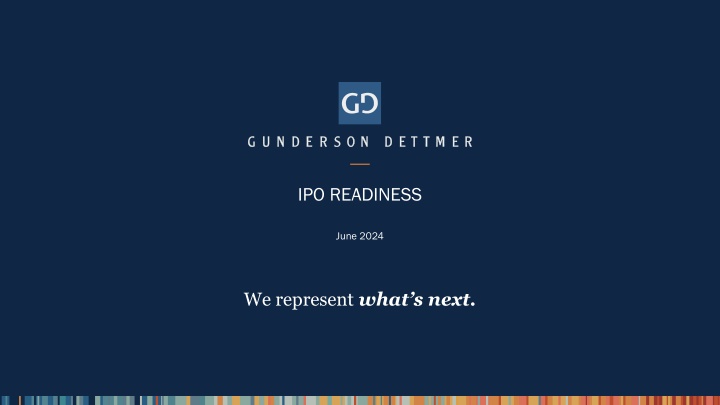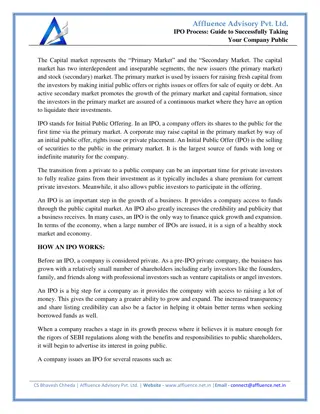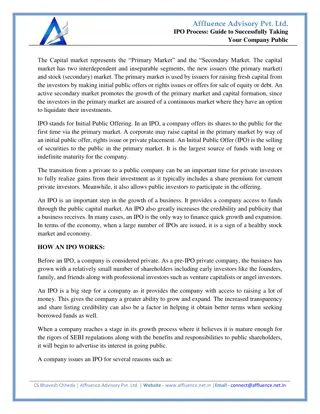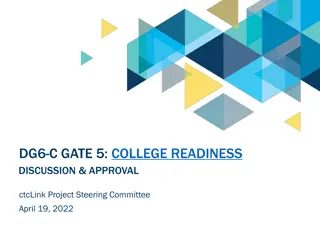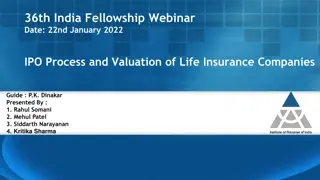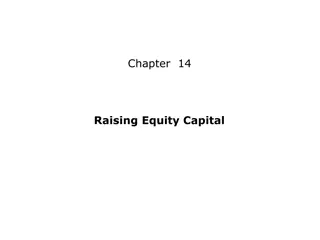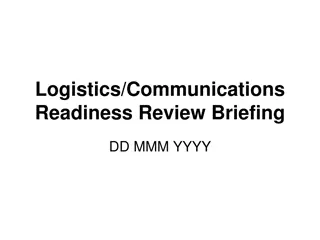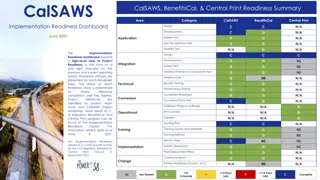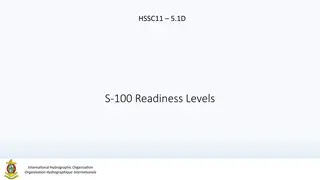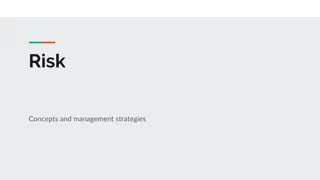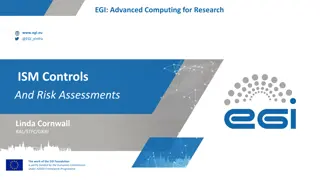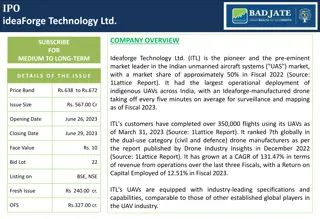Key Steps for IPO Readiness and Risk Management
"Learn about the essential stages involved in preparing for an Initial Public Offering (IPO) from auditing and accounting matters to governance diligence. Understand the significance of risk management in both business operations and board oversight. Gain insights into the necessary actions required 18-24 months before the IPO, including financial statement audits, board composition considerations, and risk management integration into strategic decision-making."
Download Presentation

Please find below an Image/Link to download the presentation.
The content on the website is provided AS IS for your information and personal use only. It may not be sold, licensed, or shared on other websites without obtaining consent from the author.If you encounter any issues during the download, it is possible that the publisher has removed the file from their server.
You are allowed to download the files provided on this website for personal or commercial use, subject to the condition that they are used lawfully. All files are the property of their respective owners.
The content on the website is provided AS IS for your information and personal use only. It may not be sold, licensed, or shared on other websites without obtaining consent from the author.
E N D
Presentation Transcript
IPO READINESS June 2024 We represent what s next.
Speakers JEFF VETTER Chair of Public Companies Silicon Valley jvetter@gunder.com +1 650 321 2400 ALEXA BELONICK Partner San Francisco abelonick@gunder.com +1 650 321 2400 ANDY THORPE Partner San Francisco athorpe@gunder.com +1 650 321 2400 2
Preparing for an IPO 18-24 months out Start of IPO Preparation Org Meeting IPO 18 to 24 Months Before IPO 12 to 18 Months Before IPO Final 6 Months Before IPO 6 to 12 Months Before IPO Governance Diligence Auditing & Accounting Matters Preparing for IPO Diligence Updates to Policies, Processes & Systems Testing-the-Waters Meetings Board Matters Refine the Business Story SEC Filings and SEC Review Team Composition S-1 Preparation Roadshow Equity Compensation Equity Compensation Pricing & Closing of the IPO Communications Investment Bankers & Analysts 3
18 to 24 months before the IPO AUDITING & ACCOUNTING MATTERS: - Audited annual financial statements need 2-3 years audited at the PCAOB-level - Quarterly and interim financial statements may need trailing eight quarters in IPO S-1 for marketing - Acquisitions may require separate stand-alone audited financial statements of recently acquired companies (or even probable acquisitions) if the acquisition is significant BOARD MATTERS: - Prepare for transition from a private company to public company style board - Consider skills, independence and diversity and potential director recruiting needs - Consider implementing one or more of public-company-style committees now (most commonly, audit and compensation committees) - Evaluate risk management oversight 4
Risk Management A BUSINESS & OPERATIONAL TOPIC FOR MANAGEMENT A GOVERNANCE TOPIC FOR BOARD OVERSIGHT ERM matrix Risk management policies, procedures and response plans (training, testing) Integration of risk management into strategic decision-making Tone at the top Active, engaged board (including committee) oversight of corporate risk Cadence of periodic updates (assessments, incidents, mitigation) Appropriate records of board oversight BOARD OVERSIGHT OF RISK MANAGEMENT 5
18 to 24 months before the IPO (contd) TEAM COMPOSITION: - Senior management critical functional areas covered and working together for some time before org meeting - Sales and finance functions ready for tyranny of quarterly results and ability to forecast and project earnings - Other critical roles legal and HR department heads in place to support IPO and post-IPO compliance, IR, IT, internal stock administrator - Outside advisors accounting/SOX consulting firm, IR preparedness firm, compensation consultant EQUITY COMPENSATION: - Consider transitioning to quarterly cadence for 409A valuations - Evaluate securities law exemptions and compliance (e.g., Rule 701) 6
12 to 18 months before the IPO GOVERNANCE: - Consider appropriateness of multi-class share structure - Consider any pre-IPO director recruitment needs UPDATES TO POLICIES, PROCESSES AND SYSTEMS: - Document management and internal controls - Communications and metrics IP, Commercial Contracts & Privacy Finance & Accounting Equity Human Resources Compliance Compensation 7
6 to 12 months before the IPO Refine the Refine the b business successful transaction; message should be consistent across platforms usiness s story tory effective positioning will be critical for a S S- -1 preparation 1 preparation assess internal bandwidth to help with early S-1 preparation. Consider sketching out key sections of the S-1 disclosure particularly the description of the business before the org meeting Sustainable Competitive Advantage Customer Purchase Decisions Based on Economic Value Proposition Aftermarket Performance Dependent on Ability to Execute Demonstrable Customer Wins Positioned to Benefit from Global Macro Trends Value Enhancing Use of Proceeds Attractive Return on Capital Invested in the Business Strong and Experienced Management Team with a Proven Track Record Large Addressable Market Poised for Product Adoption 8
6 to 12 months before the IPO PREPARE FOR IPO DILIGENCE: - Underwriters typically request records for at least past three fiscal years (in addition to backup and participating in due diligence calls with management, auditors, and sometimes key customers/partners) - Areas of focus depend on the company s industry, include cybersecurity, regulatory/IP/legal, privacy and data security EQUITY COMPENSATION: - Identify executive officers and Section 16 officers, assess changes to compensation and underlying documentation - Consider how to address RSUs or options nearing their expiration - Check for loans to executive officers - Consider change in 409A valuation methodology (e.g., PWERM) and check for cheap stock issues 9
6 to 12 months before the IPO COMMUNICATIONS: - Begin practicing coordination around communications (e.g., legal review of press releases, checking calendar of presentations against IPO process milestones) - Practice timely quarter closes and mock earnings calls INVESTMENT BANKERS & ANALYSTS: - Identify bankers that understand market conditions, the company s business and its industry (in a traditional IPO, investment bankers help position the company in the market and build a market for the shares offered) - Think about the group of analysts that will cover the business after the IPO; coordinate with underwriters on holding analyst days ahead of the IPOs - Road test investment backs, for by working with them to prepare/refine the company s investor deck for non- deal roadshows or holding testing the waters meetings with investors 10
Thank You! Please contact us with any questions: insights@gunder.com
